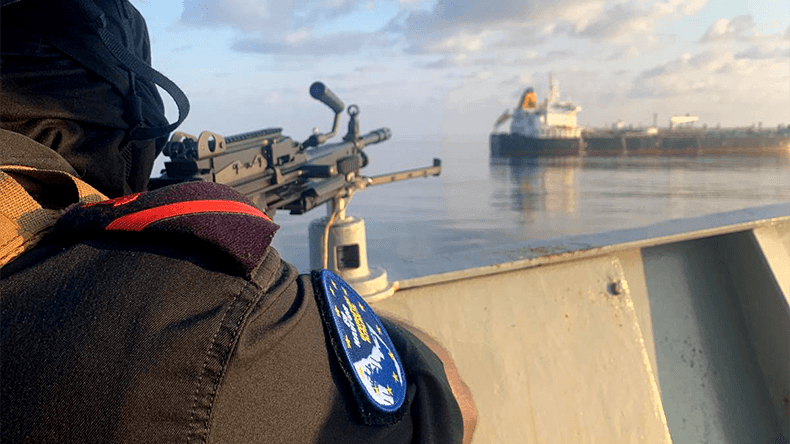We're loading the full news article for you. This includes the article content, images, author information, and related articles.
A dramatic rescue in the Indian Ocean highlights a resurgence of Somali piracy, posing a direct threat to vital shipping lanes crucial for Kenya and the East African region's economy.

European Union naval forces have successfully rescued 24 crew members from a Maltese-flagged oil tanker, the Hellas Aphrodite, after it was hijacked by Somali pirates approximately 700 nautical miles off the coast of Mogadishu. The incident, which concluded on Friday, November 7, 2025, underscores a troubling resurgence of piracy in a maritime corridor vital to East African trade.
The attack began on the morning of Thursday, November 6, 2025, when armed pirates in a skiff opened fire on the Hellas Aphrodite with machine guns and rocket-propelled grenades before boarding the vessel. The tanker, managed by the Greek company Latsco Marine Management Inc., was transporting petrol from India to South Africa. Following established anti-piracy protocols, the 24-person crew immediately secured themselves inside the ship's fortified safe room, known as the citadel, and maintained contact with naval authorities.
The European Union Naval Force (EUNAVFOR) Somalia - Operation Atalanta, dispatched the Spanish warship ESPS Victoria to the scene. In a statement released on November 7, EUNAVFOR confirmed that a "show of force" involving the warship, its helicopter, a drone, and a special operations team prompted the pirates to abandon the tanker before the naval forces boarded. The crew was found safe and unharmed.
This attack is the first successful hijacking of a commercial vessel off Somalia since May 2024 and marks a significant escalation in pirate activity. Maritime security experts have warned that the same pirate action group is likely responsible for several other recent attacks and attempted attacks in the area, using a hijacked Iranian dhow as a 'mothership' to launch operations far from the Somali coast. The United Kingdom Maritime Trade Operations (UKMTO) reported another attempted attack in the same vicinity on Friday, which was thwarted when the targeted vessel outran the pirate craft.
The resurgence of piracy in the Indian Ocean poses a significant economic and security threat to Kenya and the wider East African region. The Port of Mombasa is a critical gateway for imports and exports for Kenya and landlocked neighbours like Uganda, South Sudan, and Rwanda. Increased piracy leads to higher insurance premiums, forces shipping companies to hire private armed security, and can necessitate rerouting vessels, all of which drive up the cost of goods and disrupt supply chains.
Agayo Ogambi of the Shippers Council of Eastern Africa (SCEA) noted in January 2024 that such attacks disrupt the supply chain and delay the delivery of key Kenyan exports like tea. After a period of decline, the return of this menace threatens to reverse the economic benefits gained when the region's waters were re-designated from a high-risk area in 2022, a move that had lowered insurance costs.
EUNAVFOR's Operation Atalanta has been a cornerstone of international counter-piracy efforts since 2008, protecting World Food Programme vessels and deterring attacks. The successful liberation of the Hellas Aphrodite demonstrates the continued necessity of these naval patrols. However, security analysts suggest that a shift in international naval focus to counter Houthi attacks in the Red Sea may have inadvertently created a security vacuum, emboldening Somali pirate groups.
The International Maritime Bureau (IMB) has recorded a rise in piracy incidents in 2025. While piracy off the Somali coast had peaked in 2011 with 237 attacks, a robust international naval presence and onshore security improvements had led to a steep decline. The recent spate of incidents serves as a stark reminder that the underlying causes of piracy, including instability and economic hardship in Somalia, remain.
EUNAVFOR has stated that the threat assessment in the area remains "critical" and that a coordinated operation is underway to intercept the pirate mothership. For Kenya, whose maritime sector is directly impacted by the security of these shipping lanes, the incident is a critical call to reinforce regional and international cooperation to ensure the safety of one of the world's most crucial maritime trade routes.
Keep the conversation in one place—threads here stay linked to the story and in the forums.
Sign in to start a discussion
Start a conversation about this story and keep it linked here.
Other hot threads
E-sports and Gaming Community in Kenya
Active 9 months ago
The Role of Technology in Modern Agriculture (AgriTech)
Active 9 months ago
Popular Recreational Activities Across Counties
Active 9 months ago
Investing in Youth Sports Development Programs
Active 9 months ago